Resume
Chemical Engineer Cover Letter Examples

May 29, 2025
|
12 min read
Get your Chemical Engineer cover letter in top shape by following these steps. Learn how to mix professionalism with your personal touch, ensuring employers see your potential. Make your application the reaction they can’t ignore!
4.70 Average rating
Rated by 348 people
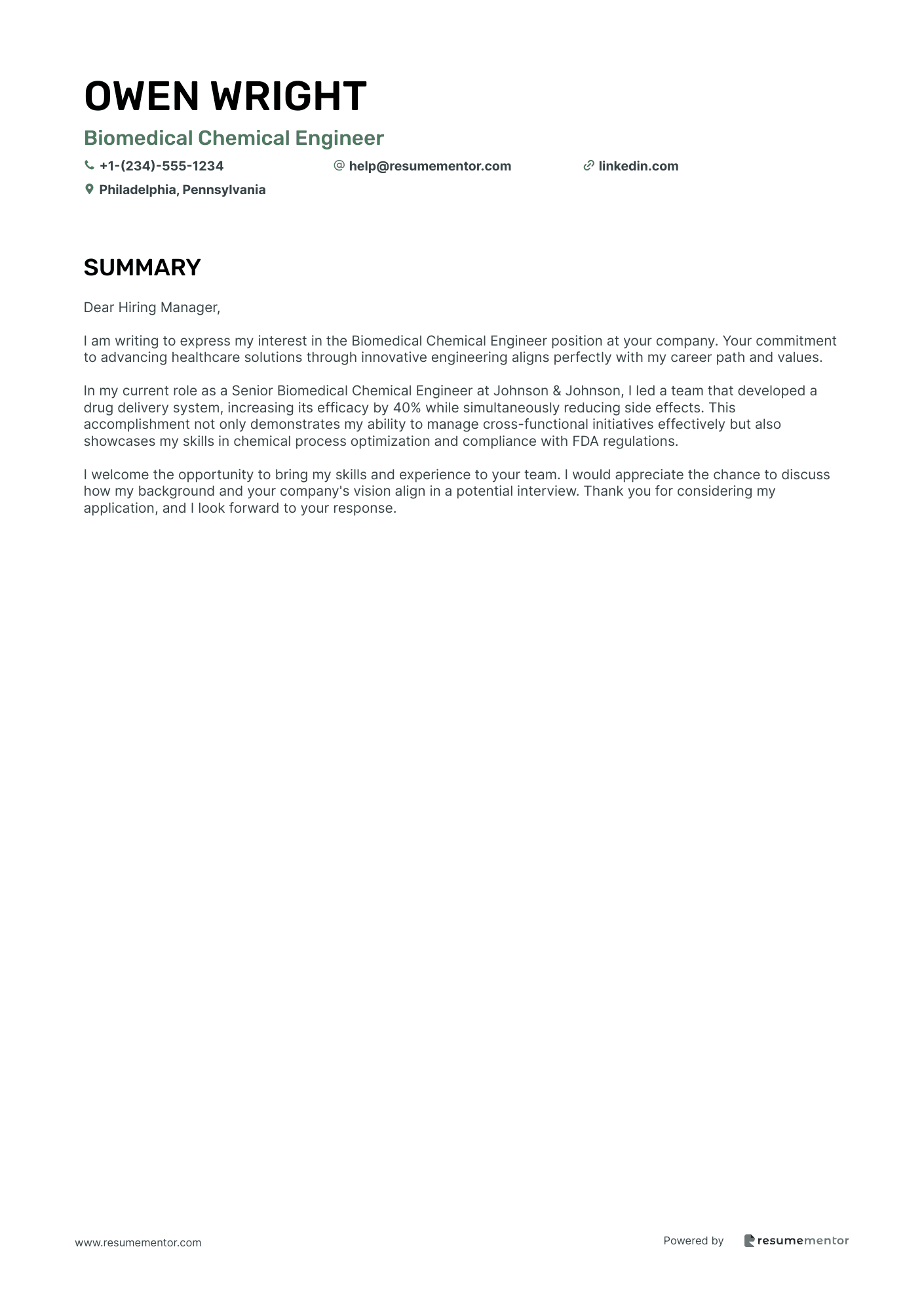
Biomedical Chemical Engineer
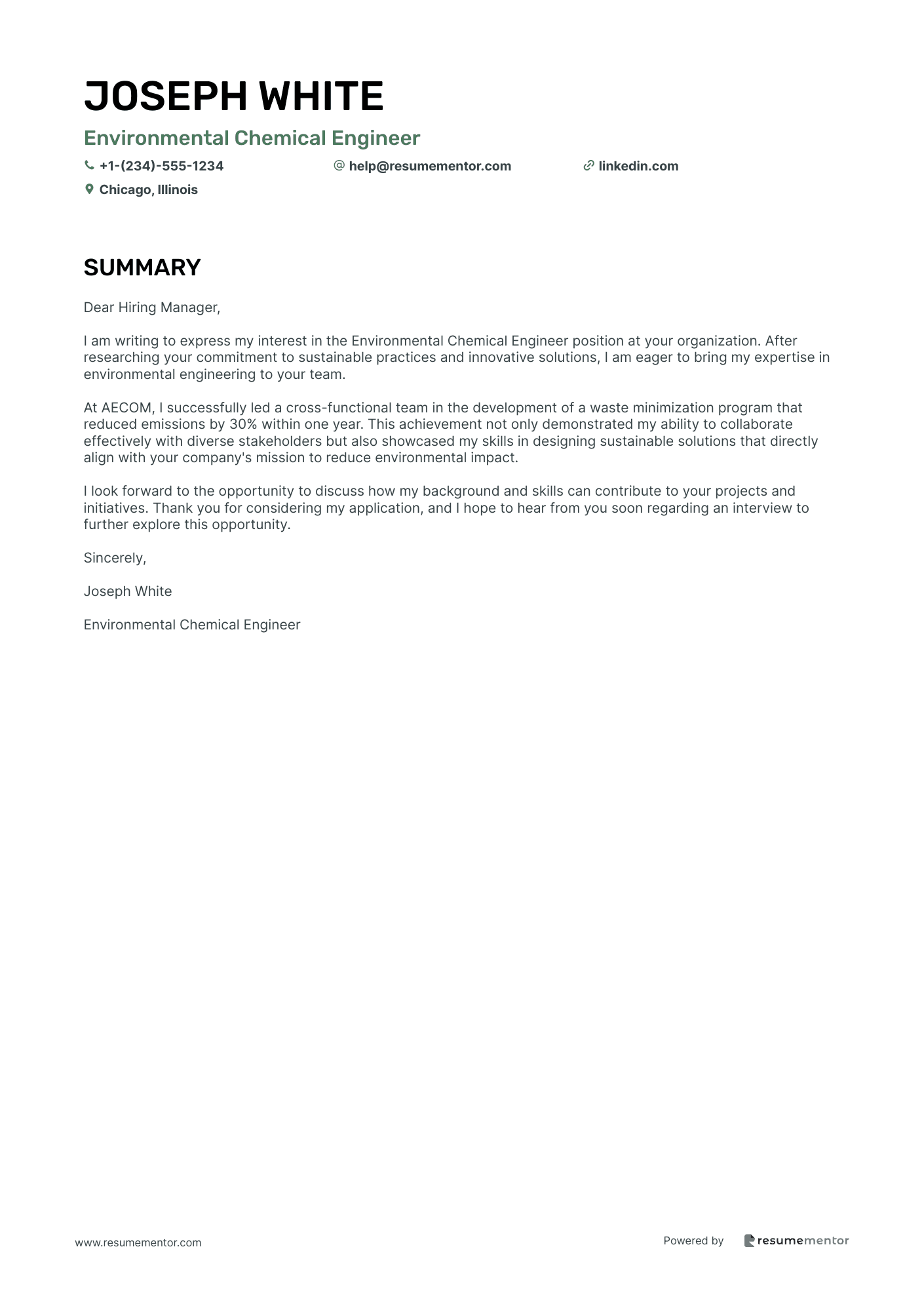
Environmental Chemical Engineer
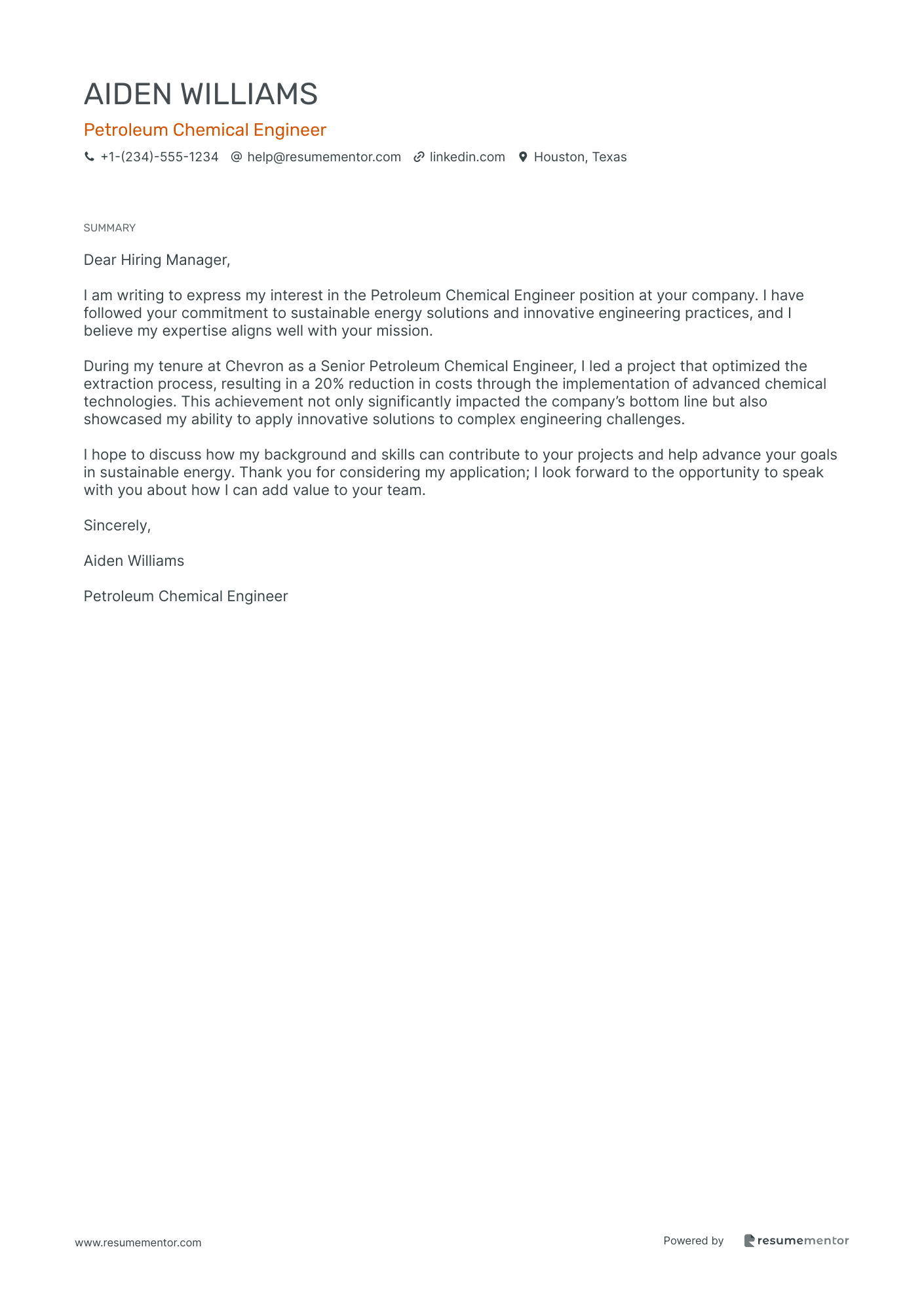
Petroleum Chemical Engineer
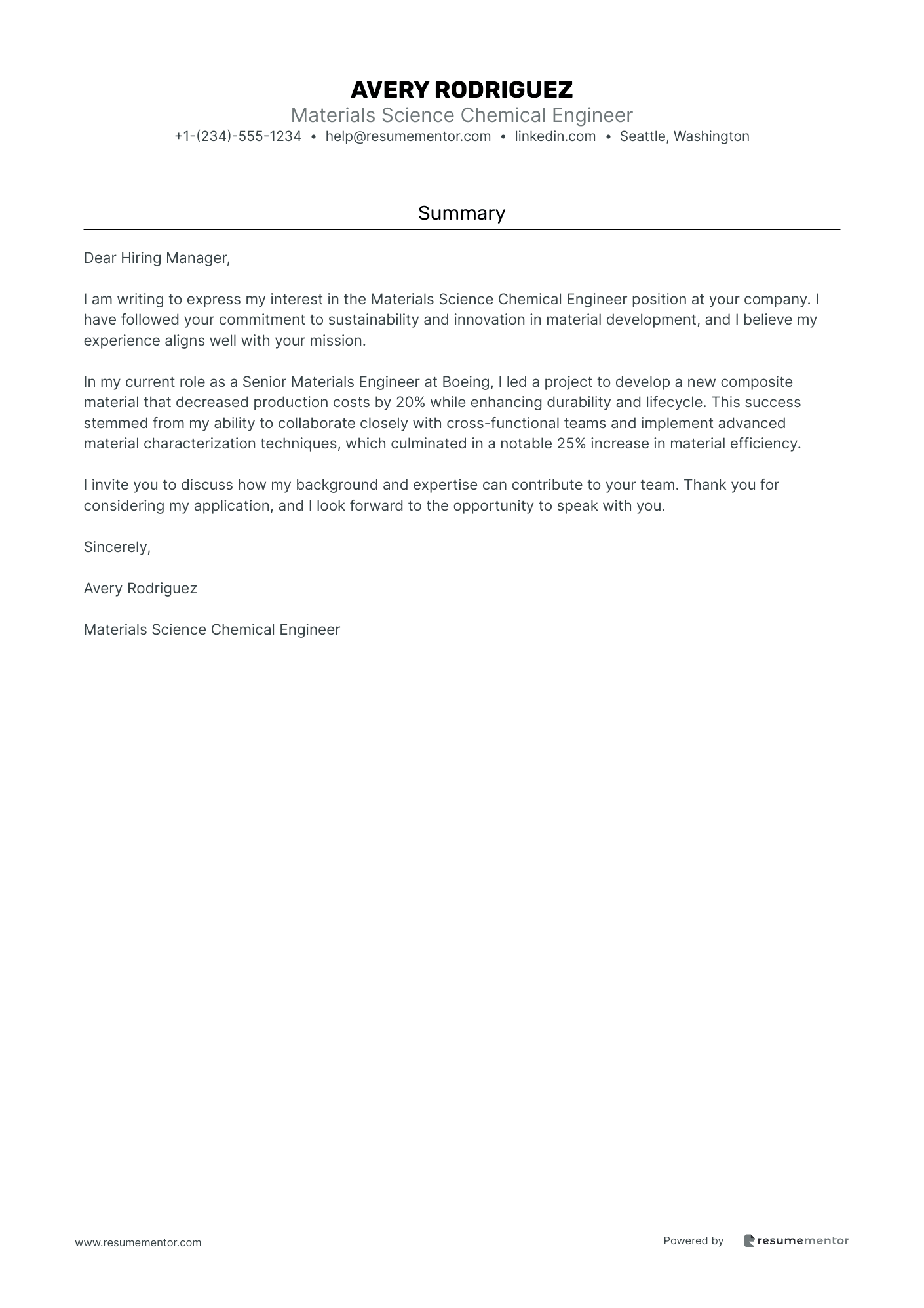
Materials Science Chemical Engineer
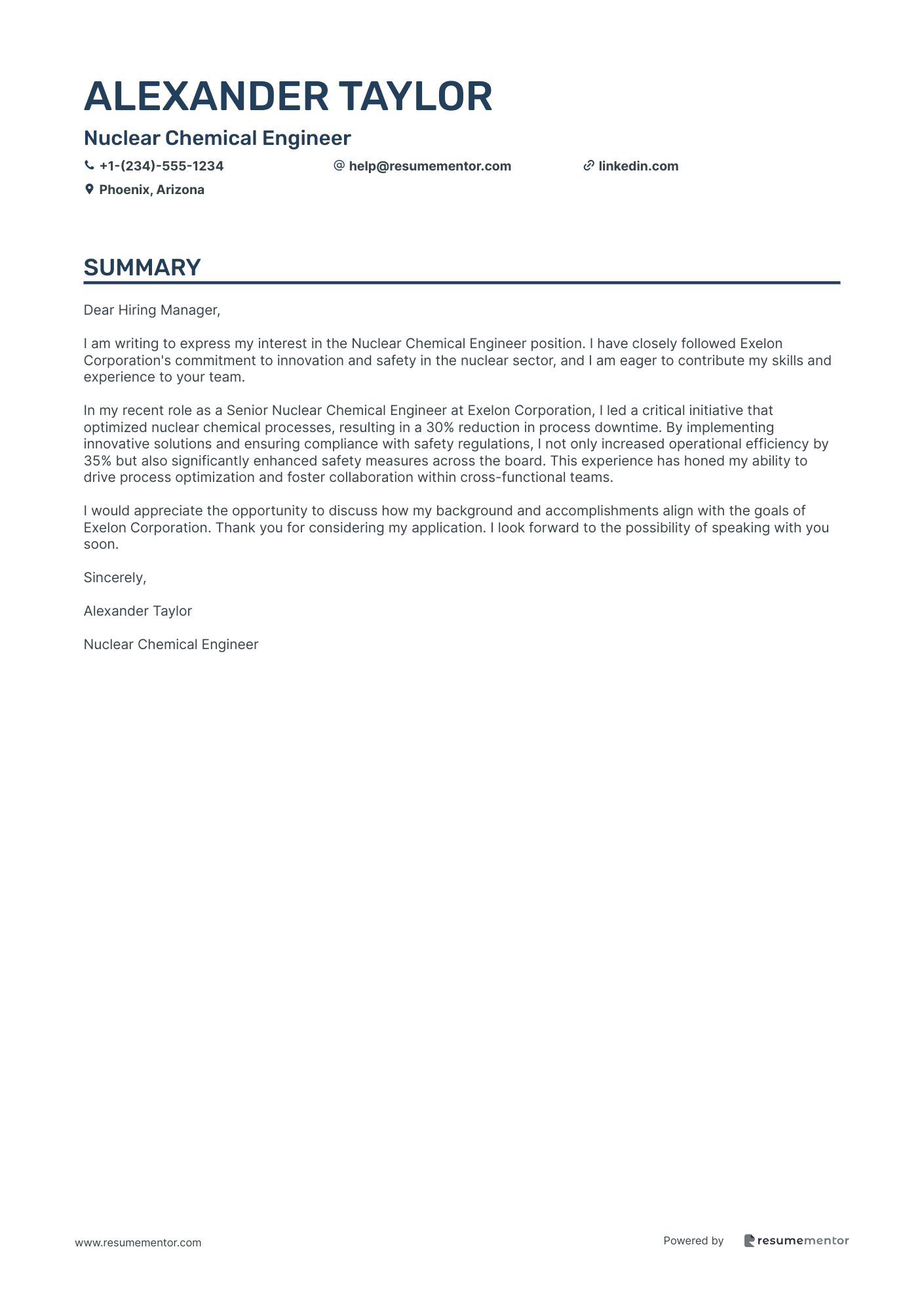
Nuclear Chemical Engineer
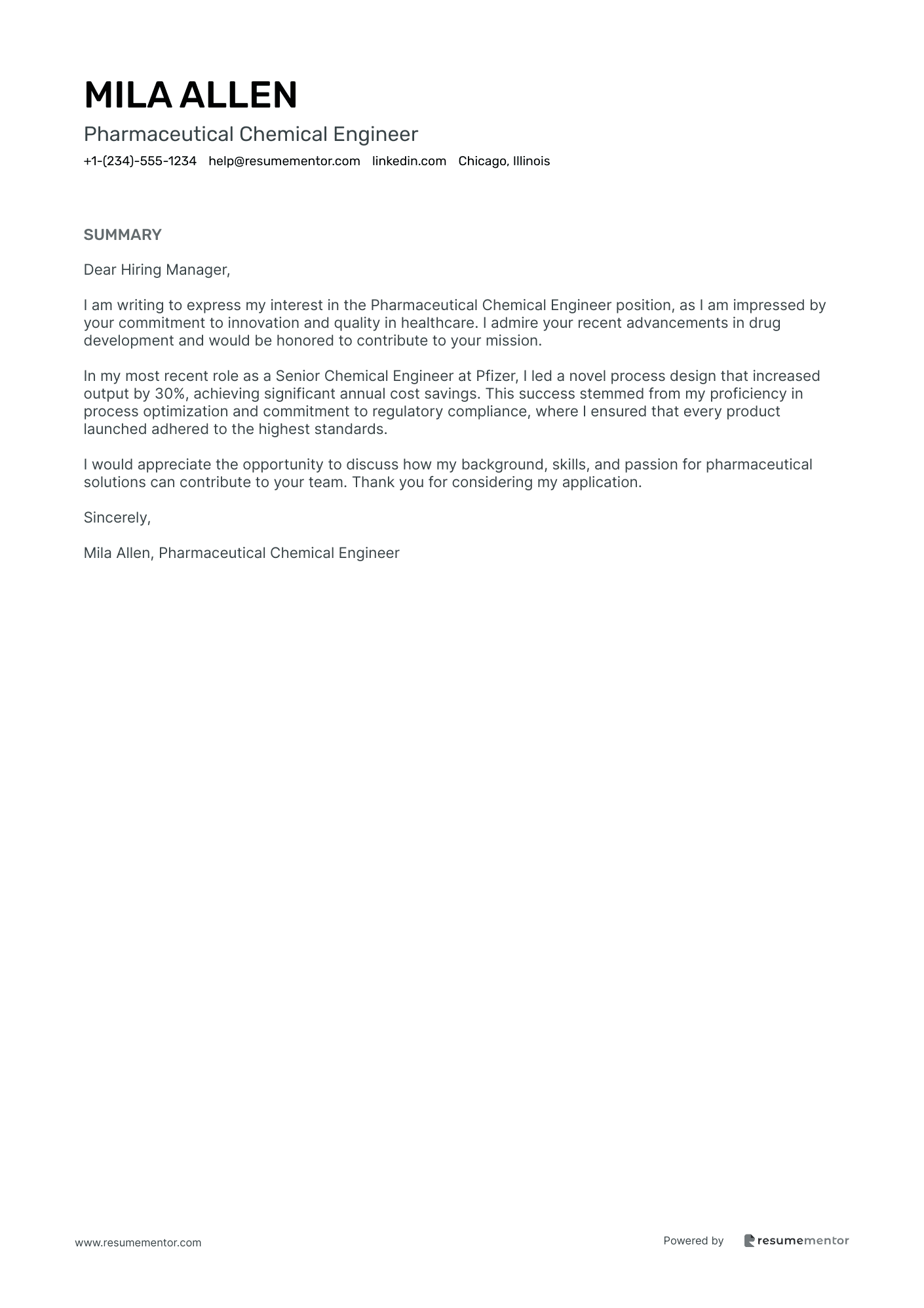
Pharmaceutical Chemical Engineer
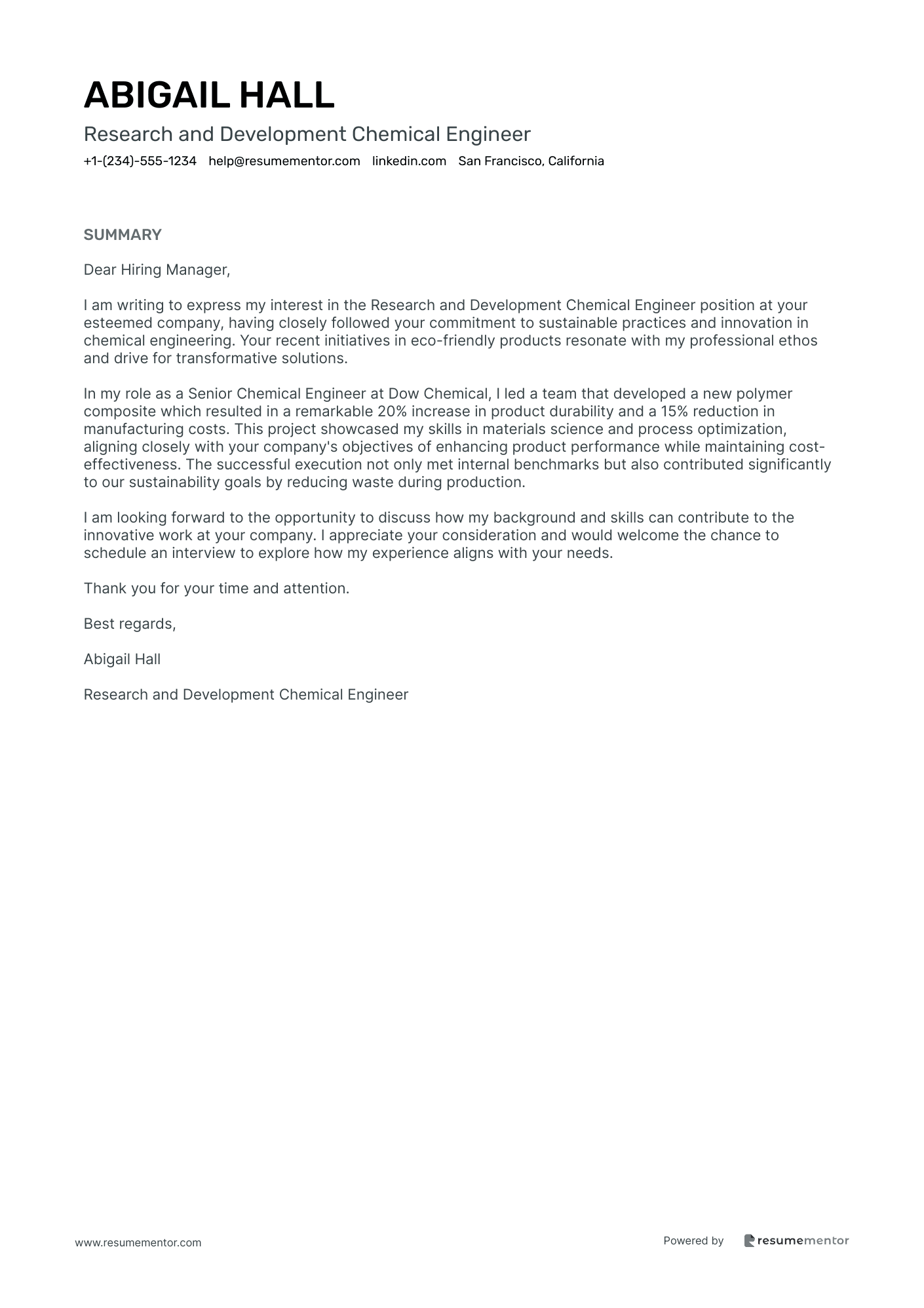
Research and Development Chemical Engineer
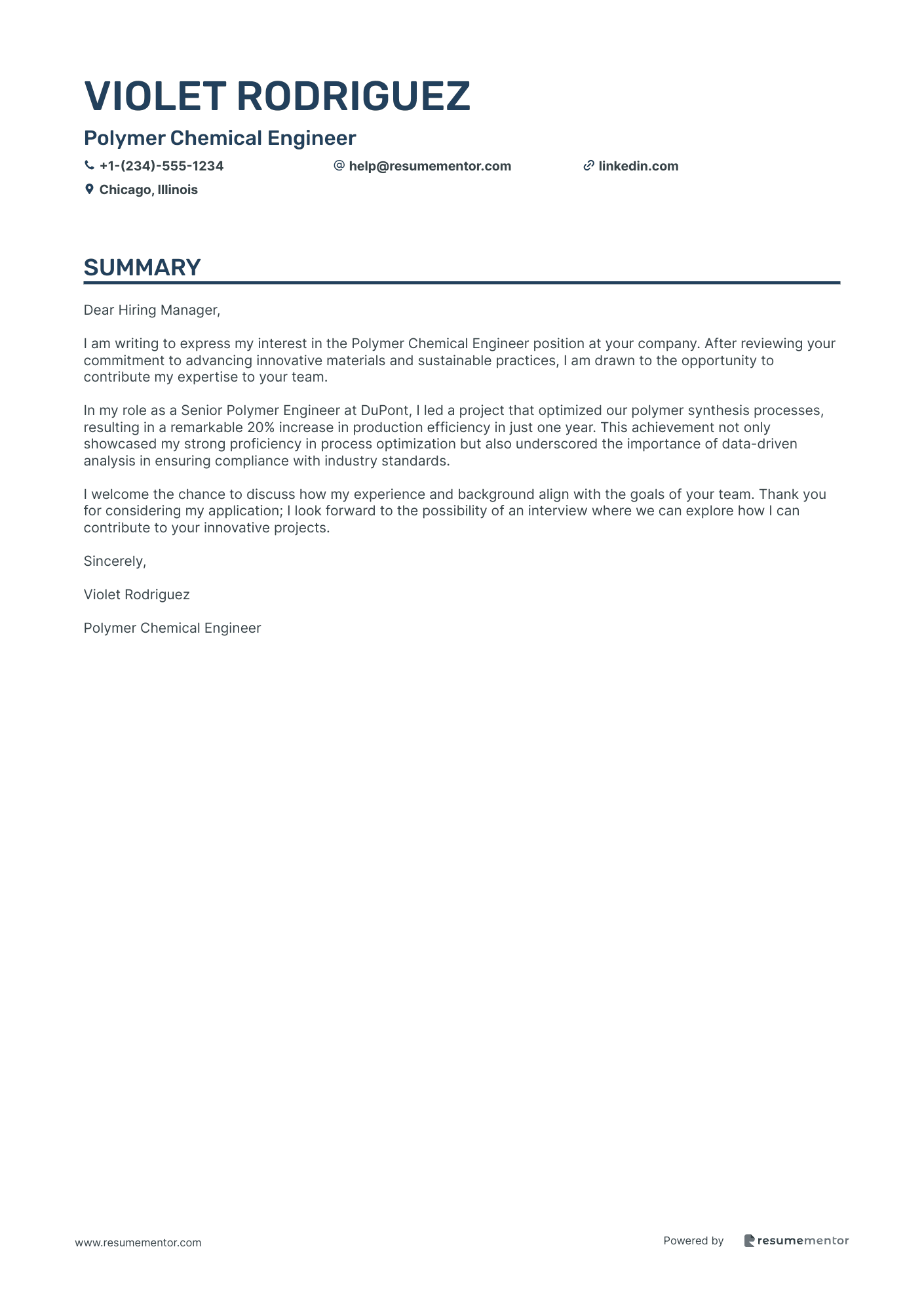
Polymer Chemical Engineer
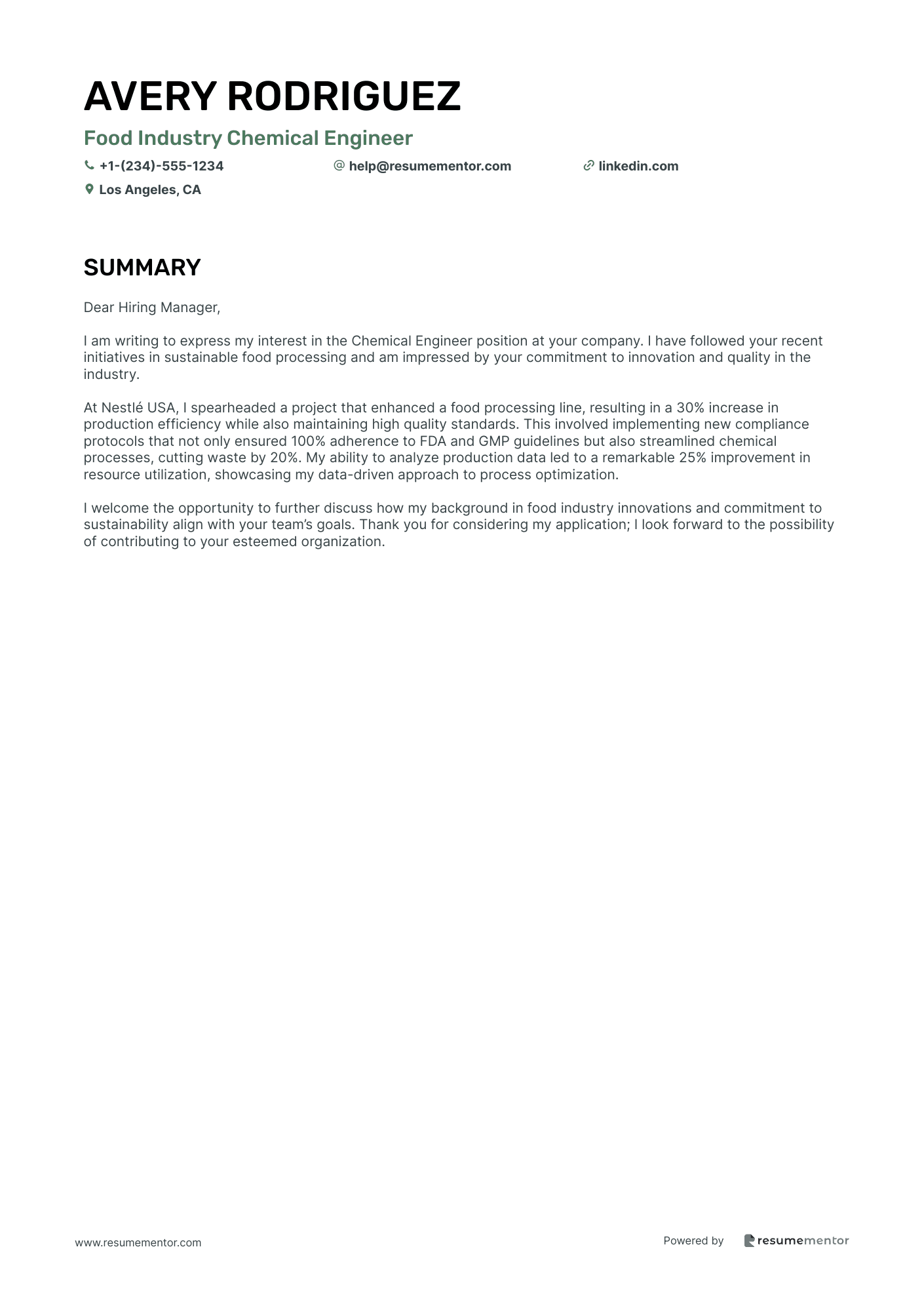
Food Industry Chemical Engineer
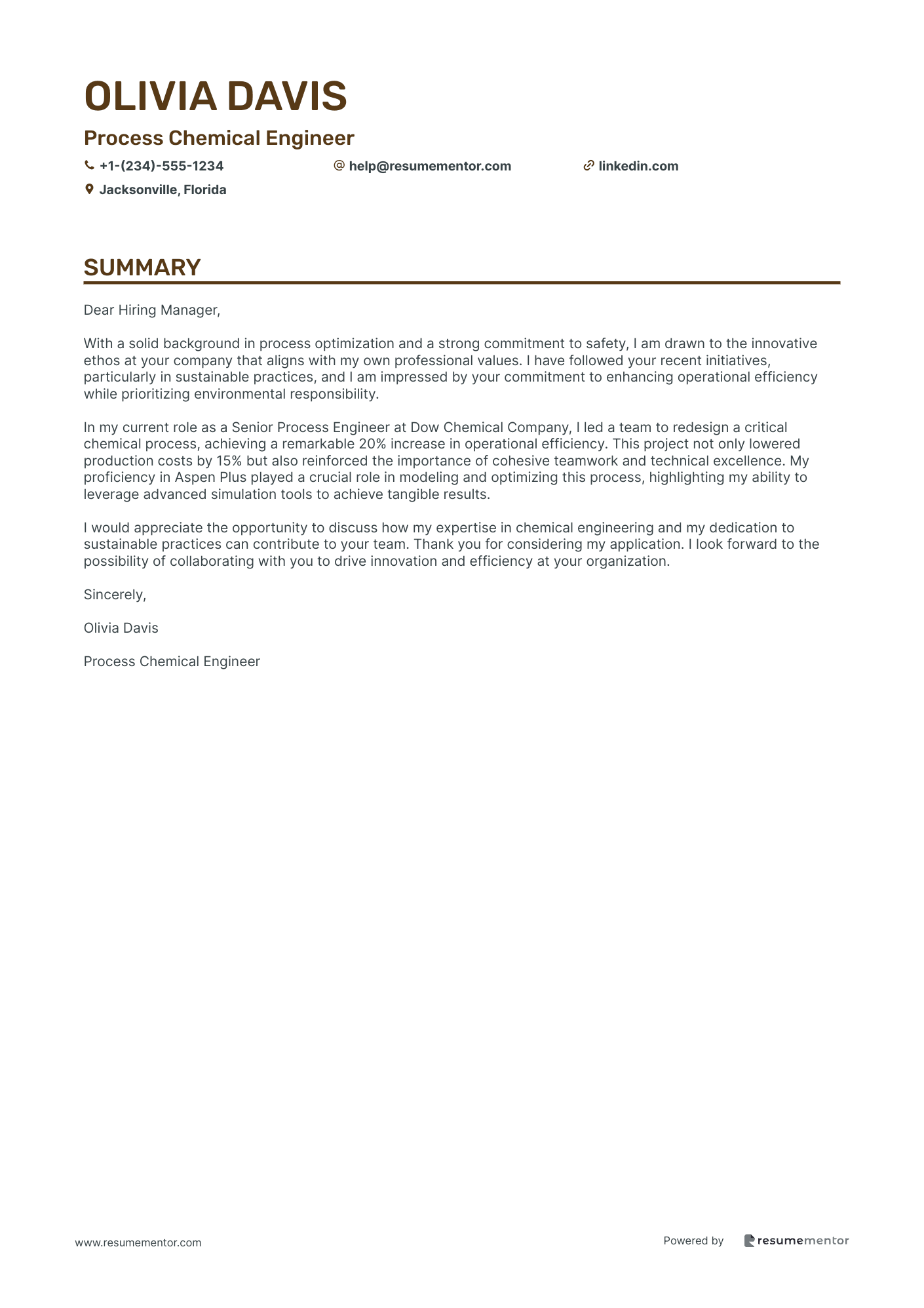
Process Chemical Engineer

Biomedical Chemical Engineer cover letter sample
When applying for this position, emphasize your technical skills in chemical processes and system design. Highlight any hands-on experience in lab settings or with equipment relevant to biomedical projects. If you've participated in internships or research projects, mention these along with specific outcomes. Certifications in bioengineering or related fields add weight to your application. Use the 'skill-action-result' format to quantify your impact, detailing how your contributions led to improvements in product safety or efficiency, showcasing your ability to innovate in the biomedical sector.
Owen Wright
Biomedical Chemical Engineer
Summary
Dear Hiring Manager,
I am writing to express my interest in the Biomedical Chemical Engineer position at your company. Your commitment to advancing healthcare solutions through innovative engineering aligns perfectly with my career path and values.
In my current role as a Senior Biomedical Chemical Engineer at Johnson & Johnson, I led a team that developed a drug delivery system, increasing its efficacy by 40% while simultaneously reducing side effects. This accomplishment not only demonstrates my ability to manage cross-functional initiatives effectively but also showcases my skills in chemical process optimization and compliance with FDA regulations.
I welcome the opportunity to bring my skills and experience to your team. I would appreciate the chance to discuss how my background and your company's vision align in a potential interview. Thank you for considering my application, and I look forward to your response.
Environmental Chemical Engineer cover letter sample
When applying for this position, it's important to emphasize any relevant project experience in environmental design or chemical processes. Highlight your proficiency with software tools like AutoCAD or MATLAB for modeling and analysis. If you've completed coursework in areas such as toxicology or environmental regulations, be sure to mention these details. Additionally, provide examples of how your analytical skills have led to successful project outcomes or improved compliance. Use the 'skill-action-result' format to clearly showcase how you’ve made a positive impact in your previous roles.
Joseph White
Environmental Chemical Engineer
Summary
Dear Hiring Manager,
I am writing to express my interest in the Environmental Chemical Engineer position at your organization. After researching your commitment to sustainable practices and innovative solutions, I am eager to bring my expertise in environmental engineering to your team.
At AECOM, I successfully led a cross-functional team in the development of a waste minimization program that reduced emissions by 30% within one year. This achievement not only demonstrated my ability to collaborate effectively with diverse stakeholders but also showcased my skills in designing sustainable solutions that directly align with your company's mission to reduce environmental impact.
I look forward to the opportunity to discuss how my background and skills can contribute to your projects and initiatives. Thank you for considering my application, and I hope to hear from you soon regarding an interview to further explore this opportunity.
Sincerely,
Joseph White
Environmental Chemical Engineer
Petroleum Chemical Engineer cover letter sample
When applying for this position, emphasize your hands-on experience with process design and optimization. Highlight any relevant projects where you improved efficiency or reduced costs. Showcase your familiarity with safety regulations and industry standards, as these are critical in this field. If you've worked with simulation software or participated in field studies, include these details to demonstrate technical competency. Providing specific examples of your contributions—using a 'skill-action-result' format—will underline your impact and suitability for the role, enhancing your application significantly.
Aiden Williams
Petroleum Chemical Engineer
Summary
Dear Hiring Manager,
I am writing to express my interest in the Petroleum Chemical Engineer position at your company. I have followed your commitment to sustainable energy solutions and innovative engineering practices, and I believe my expertise aligns well with your mission.
During my tenure at Chevron as a Senior Petroleum Chemical Engineer, I led a project that optimized the extraction process, resulting in a 20% reduction in costs through the implementation of advanced chemical technologies. This achievement not only significantly impacted the company’s bottom line but also showcased my ability to apply innovative solutions to complex engineering challenges.
I hope to discuss how my background and skills can contribute to your projects and help advance your goals in sustainable energy. Thank you for considering my application; I look forward to the opportunity to speak with you about how I can add value to your team.
Sincerely,
Aiden Williams
Petroleum Chemical Engineer
Materials Science Chemical Engineer cover letter sample
When applying for this role, emphasize any relevant experience in materials testing or research. Highlight technical skills, such as proficiency in CAD software or lab techniques related to polymers and composites. Mention your familiarity with industry standards like ISO or ASTM to showcase your regulatory knowledge. It's beneficial to include any projects where you improved a process or developed a new material, detailing your role and the impact. Use clear examples and metrics to illustrate how your contributions led to cost savings or performance enhancements.
Avery Rodriguez
Materials Science Chemical Engineer
Summary
Dear Hiring Manager,
I am writing to express my interest in the Materials Science Chemical Engineer position at your company. I have followed your commitment to sustainability and innovation in material development, and I believe my experience aligns well with your mission.
In my current role as a Senior Materials Engineer at Boeing, I led a project to develop a new composite material that decreased production costs by 20% while enhancing durability and lifecycle. This success stemmed from my ability to collaborate closely with cross-functional teams and implement advanced material characterization techniques, which culminated in a notable 25% increase in material efficiency.
I invite you to discuss how my background and expertise can contribute to your team. Thank you for considering my application, and I look forward to the opportunity to speak with you.
Sincerely,
Avery Rodriguez
Materials Science Chemical Engineer
Nuclear Chemical Engineer cover letter sample
When crafting your cover letter, focus on your technical expertise in nuclear chemistry and engineering. Highlight any previous project experience related to radiation safety or reactor design. Include certifications like 'Radiation Protection' or relevant engineering degrees to showcase your educational background. Emphasize teamwork and your ability to communicate complex ideas clearly. Offer concrete examples of how your work has led to improved safety protocols or increased efficiency in processes. Using a 'skill-action-result' format will strengthen your claims and demonstrate your impact in past roles.
Alexander Taylor
Nuclear Chemical Engineer
Summary
Dear Hiring Manager,
I am writing to express my interest in the Nuclear Chemical Engineer position. I have closely followed Exelon Corporation's commitment to innovation and safety in the nuclear sector, and I am eager to contribute my skills and experience to your team.
In my recent role as a Senior Nuclear Chemical Engineer at Exelon Corporation, I led a critical initiative that optimized nuclear chemical processes, resulting in a 30% reduction in process downtime. By implementing innovative solutions and ensuring compliance with safety regulations, I not only increased operational efficiency by 35% but also significantly enhanced safety measures across the board. This experience has honed my ability to drive process optimization and foster collaboration within cross-functional teams.
I would appreciate the opportunity to discuss how my background and accomplishments align with the goals of Exelon Corporation. Thank you for considering my application. I look forward to the possibility of speaking with you soon.
Sincerely,
Alexander Taylor
Nuclear Chemical Engineer
Pharmaceutical Chemical Engineer cover letter sample
When preparing your application, it's important to showcase your experience in chemical processes and material science. Highlight any familiarity with regulatory standards like FDA guidelines or GMP practices. If you have managed projects, stress your ability to lead teams and meet deadlines. Mention any relevant software skills, such as proficiency in CAD or simulation software, to show your technical capabilities. Provide quantifiable results from your previous roles, focusing on how your contributions improved efficiency or reduced costs, using a 'calculation-action-result' format.
Mila Allen
Pharmaceutical Chemical Engineer
Summary
Dear Hiring Manager,
I am writing to express my interest in the Pharmaceutical Chemical Engineer position, as I am impressed by your commitment to innovation and quality in healthcare. I admire your recent advancements in drug development and would be honored to contribute to your mission.
In my most recent role as a Senior Chemical Engineer at Pfizer, I led a novel process design that increased output by 30%, achieving significant annual cost savings. This success stemmed from my proficiency in process optimization and commitment to regulatory compliance, where I ensured that every product launched adhered to the highest standards.
I would appreciate the opportunity to discuss how my background, skills, and passion for pharmaceutical solutions can contribute to your team. Thank you for considering my application.
Sincerely,
Mila Allen, Pharmaceutical Chemical Engineer
Research and Development Chemical Engineer cover letter sample
When applying for this role, it's essential to showcase any hands-on laboratory experience or project work in chemical processes. Emphasize your problem-solving skills, especially in optimizing formulations or improving product quality. If you have completed relevant coursework or certifications, such as 'Chemical Process Engineering' or 'Material Science', be sure to include those details. Highlight achievements using a 'skill-action-result' approach, demonstrating how your contributions led to successful experimental outcomes or cost reductions in previous projects. Bring attention to your teamwork abilities and collaborative projects that drove innovation.
Abigail Hall
Research and Development Chemical Engineer
Summary
Dear Hiring Manager,
I am writing to express my interest in the Research and Development Chemical Engineer position at your esteemed company, having closely followed your commitment to sustainable practices and innovation in chemical engineering. Your recent initiatives in eco-friendly products resonate with my professional ethos and drive for transformative solutions.
In my role as a Senior Chemical Engineer at Dow Chemical, I led a team that developed a new polymer composite which resulted in a remarkable 20% increase in product durability and a 15% reduction in manufacturing costs. This project showcased my skills in materials science and process optimization, aligning closely with your company's objectives of enhancing product performance while maintaining cost-effectiveness. The successful execution not only met internal benchmarks but also contributed significantly to our sustainability goals by reducing waste during production.
I am looking forward to the opportunity to discuss how my background and skills can contribute to the innovative work at your company. I appreciate your consideration and would welcome the chance to schedule an interview to explore how my experience aligns with your needs.
Thank you for your time and attention.
Best regards,
Abigail Hall
Research and Development Chemical Engineer
Polymer Chemical Engineer cover letter sample
When applying for this role, it's essential to highlight any experience with polymer synthesis or characterization techniques. Mention your familiarity with tools like GPC or NMR, and any relevant projects you've completed. If you have certifications or coursework in materials science or chemical engineering, include these to demonstrate your knowledge. Share specific examples where your work led to improved material properties or production efficiencies, using a 'skill-action-result' format to showcase the direct impact of your contributions on previous projects or teams.
Violet Rodriguez
Polymer Chemical Engineer
Summary
Dear Hiring Manager,
I am writing to express my interest in the Polymer Chemical Engineer position at your company. After reviewing your commitment to advancing innovative materials and sustainable practices, I am drawn to the opportunity to contribute my expertise to your team.
In my role as a Senior Polymer Engineer at DuPont, I led a project that optimized our polymer synthesis processes, resulting in a remarkable 20% increase in production efficiency in just one year. This achievement not only showcased my strong proficiency in process optimization but also underscored the importance of data-driven analysis in ensuring compliance with industry standards.
I welcome the chance to discuss how my experience and background align with the goals of your team. Thank you for considering my application; I look forward to the possibility of an interview where we can explore how I can contribute to your innovative projects.
Sincerely,
Violet Rodriguez
Polymer Chemical Engineer
Food Industry Chemical Engineer cover letter sample
When applying for this role, it's vital to underscore any relevant experience in food processing or materials development. Highlight your familiarity with safety regulations and quality control standards specific to the food industry. If you've taken courses in food chemistry or processing technology, be sure to mention these, including any projects that demonstrate practical application. Provide examples using the 'skill-action-result' format, showing how your expertise improved production efficiency, reduced costs, or enhanced product quality in previous roles.
Avery Rodriguez
Food Industry Chemical Engineer
Summary
Dear Hiring Manager,
I am writing to express my interest in the Chemical Engineer position at your company. I have followed your recent initiatives in sustainable food processing and am impressed by your commitment to innovation and quality in the industry.
At Nestlé USA, I spearheaded a project that enhanced a food processing line, resulting in a 30% increase in production efficiency while also maintaining high quality standards. This involved implementing new compliance protocols that not only ensured 100% adherence to FDA and GMP guidelines but also streamlined chemical processes, cutting waste by 20%. My ability to analyze production data led to a remarkable 25% improvement in resource utilization, showcasing my data-driven approach to process optimization.
I welcome the opportunity to further discuss how my background in food industry innovations and commitment to sustainability align with your team’s goals. Thank you for considering my application; I look forward to the possibility of contributing to your esteemed organization.
Process Chemical Engineer cover letter sample
When crafting your cover letter, emphasize your technical skills in process design and optimization. Highlight any hands-on experience with industry-standard software, such as Aspen Plus or HYSYS. Detail your knowledge of safety regulations, as this is crucial for any role in chemical processing. Include examples of successful projects where you improved efficiency or reduced costs, using metrics when possible. Mention your teamwork and problem-solving abilities, as collaboration is essential in this field. Lastly, refer to relevant certifications, such as Six Sigma or Process Safety Management, to showcase your commitment to excellence.
Olivia Davis
Process Chemical Engineer
Summary
Dear Hiring Manager,
With a solid background in process optimization and a strong commitment to safety, I am drawn to the innovative ethos at your company that aligns with my own professional values. I have followed your recent initiatives, particularly in sustainable practices, and I am impressed by your commitment to enhancing operational efficiency while prioritizing environmental responsibility.
In my current role as a Senior Process Engineer at Dow Chemical Company, I led a team to redesign a critical chemical process, achieving a remarkable 20% increase in operational efficiency. This project not only lowered production costs by 15% but also reinforced the importance of cohesive teamwork and technical excellence. My proficiency in Aspen Plus played a crucial role in modeling and optimizing this process, highlighting my ability to leverage advanced simulation tools to achieve tangible results.
I would appreciate the opportunity to discuss how my expertise in chemical engineering and my dedication to sustainable practices can contribute to your team. Thank you for considering my application. I look forward to the possibility of collaborating with you to drive innovation and efficiency at your organization.
Sincerely,
Olivia Davis
Process Chemical Engineer
Related Articles

Continue Reading
Check more recommended readings to get the job of your dreams.
Resume
Resources
Tools
© 2026. All rights reserved.
Made with love by people who care.
